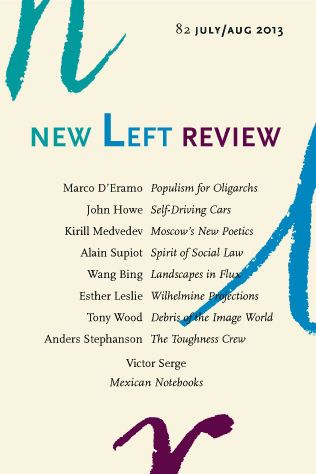
CONTENTS
-
Marco D'Eramo: Populism and the New Oligarchy
Tracking the terms ‘populism’ and ‘the people’ from the 19th century, Marco D’Eramo offers a striking new interpretation of their current applications—the first levelled indiscriminately at any political force that steps outside the bounds of convention, the second banished from the scene.
-
Victor Serge: Mexican Notebooks: 1940–1947
Recently discovered diaries of the exiled novelist, with portraits of associates past and present, reflections on the Second World War, and vivid descriptions of the country where Serge lived out his final years.
-
Kirill Medvedev: Beyond the Poetics of Privatization
After a long post-Soviet decade in which liberal ideas held sway, a new paradigm of politicized poetry has emerged in Russia. One of its leading leftist practitioners explores the tangled history of writing in a ‘civic’ mode, from Bolshevik revolution to resurgence under Putin.
-
John Howe: Prototype Boulevard
The global auto industry, mired in over-capacity, is pinning its hopes on collaboration with Silicon Valley. John Howe runs a road-check on the virtues of electric engines, robotic parking and self-driving cars.
-
Alain Supiot: Grandeur and Misery of the Social State
Kafka’s day job, defending injured factory workers, as starting point for an illuminating study of the West’s social-protection mechanisms. Mixed legacies and uncertain future of a system built to mitigate the tensions of industrialization.
-
Wang Bing: Filming a Land in Flux
The director of West of the Tracks discusses his upbringing between rural and urban worlds, his film education and his documentary practice. Epic portraits of China’s changing face, and of lives transformed by the gravitational pull of socio-economic laws.
BOOK REVIEWS
- Tony Wood on Hito Steyerl, The Wretched of the Screen. Dilemmas of representation—aesthetic and political—in the age of the super-abundant image.
- Anders Stephanson on Peter Beinart, The Icarus Syndrome. American foreign policy from Wilson to Obama, through the spectacles of Niebuhrian realism.
- Esther Leslie on John Phillip Short, Magic Lantern Empire. What role did popular visions play in fin-de-siècle German colonialism?
Articles:
-
Victor Serge,
‘Mexican Notebooks’
Recently discovered diaries of the exiled novelist, with portraits of associates past and present, reflections on the Second World War, and vivid descriptions of the country where Serge lived out his final years.
-
Anders Stephanson,
‘The Toughness Crew’
Anders Stephanson on Peter Beinart, The Icarus Syndrome. American foreign policy from Wilson to Obama, through the spectacles of Niebuhrian realism.
-
Wang Bing,
‘Filming a Land in Flux’
The director of West of the Tracks discusses his upbringing between rural and urban worlds, his film education and his documentary practice. Epic portraits of Chinas changing face, and of lives transformed by the gravitational pull of socio-economic laws.
Editorials:
-
Force and Consent
As war looms again in the Middle East, what are the aims of the Republican Administration, and how far do they mark a break in the long-term objectives of US global strategy? The changing elements of American hegemony in the post-Cold War world.
-
NLR at 50,
What remains of the neo-liberal order after the implosion of 2008with what implications for a journal of the left? Notes for a future research agenda, as NLR enters its quinquagenary year.
-
Wall Street Crisis,
Against mainstream accounts, Peter Gowan argues that the origins of the global financial crisis lie in the dynamics of the New Wall Street System that has emerged since the 1980s. Contours of the Atlantic model, and implicationsgeopolitical, ideological, economicof its blow-out.
-
Afghanistan,
Reasons for the Wests stalemate in Afghanistan sought neither in lack of troops and imperial treasure, nor in Pakistani obstruction, but in the very nature of the occupation regime. Tariq Ali on the actual results of state-building in the Hindu Kush, as a broken country is subjected to the combined predations of NGOs and NATO.
-
NPT,
What are the geopolitical origins of the NPT, and what are its actual effects? Non-proliferation as nuclear privilege of the few, weapon of intimidation of the one, submission of the manyand its impact on the peace movement.
-
Concert of Powers,
A reckoning of global shifts in political and economic relations, with China emerging as new workshop of the world and US power, rationally applied elsewhere, skewed by Israeli interests in the Middle East. Oppositions to it gauged, along with theoretical visions that offer exits from the perpetual free-market present.
-
Arab Concatenation,
From Tunis to Manama, 2011 has brought a chain-reaction of popular upheavals, in a region where imperial domination and domestic despotism have long been entwined. A call for political liberty to reconnect with social equality and Arab fraternity, in a radical new internationalism.
-
2011,
Echoes of past rebellions in 2011s global upsurge of protest. Against a backdrop of world economic slump, what forces will shape the outcome of contests between a raddled system and its emergent challengers?
Articles:
-
Kirill Medvedev,
‘Beyond the Poetics of Privatization’
After a long post-Soviet decade in which liberal ideas held sway, a new paradigm of politicized poetry has emerged in Russia. One of its leading leftist practitioners explores the tangled history of writing in a civic mode, from Bolshevik revolution to resurgence under Putin.
-
Alain Supiot,
‘The Social State’
Kafkas day job, defending injured factory workers, as starting point for an illuminating study of the Wests social-protection mechanisms. Mixed legacies and uncertain future of a system built to mitigate the tensions of industrialization.
-
John Howe,
‘Prototype Boulevard’
The global auto industry, mired in over-capacity, is pinning its hopes on collaboration with Silicon Valley. John Howe runs a road-check on the virtues of electric engines, robotic parking and self-driving cars.
-
Tony Wood,
‘Poor Images’
Tony Wood on Hito Steyerl, The Wretched of the Screen. Dilemmas of representationaesthetic and politicalin the age of the super-abundant image.
-
Esther Leslie,
‘Projecting Empire’
Esther Leslie on John Phillip Short, Magic Lantern Empire. What role did popular visions play in fin-de-siècle German colonialism?

